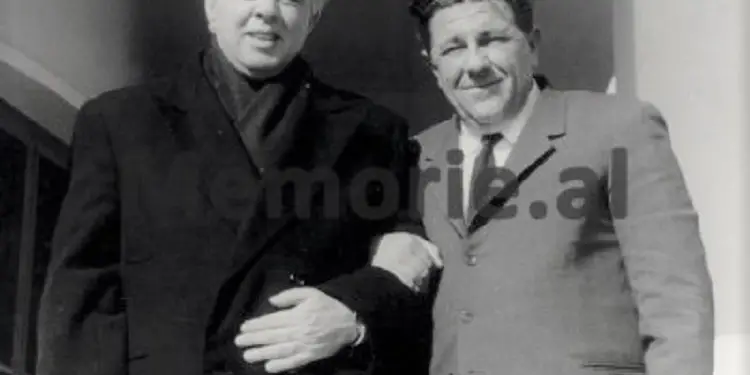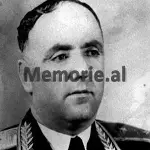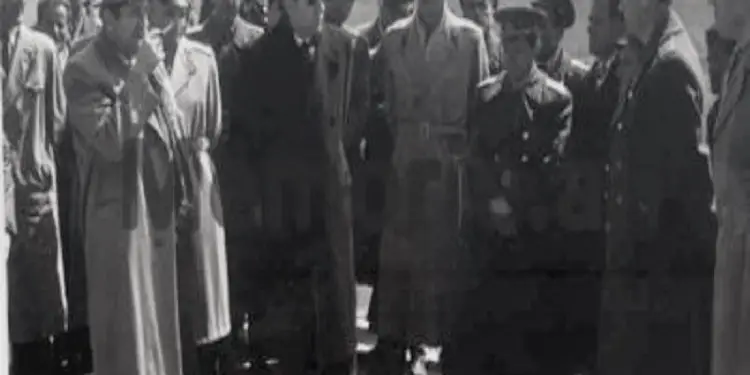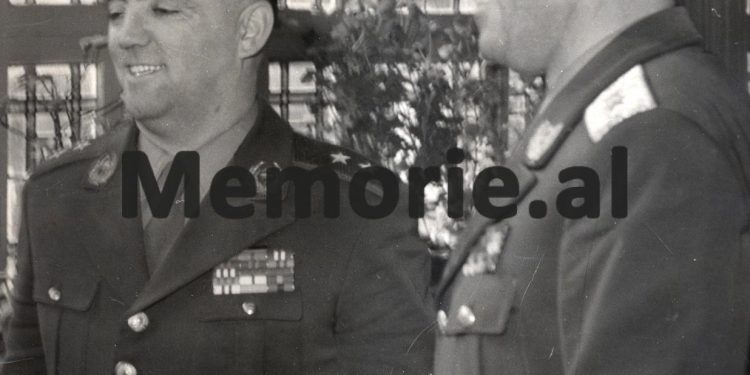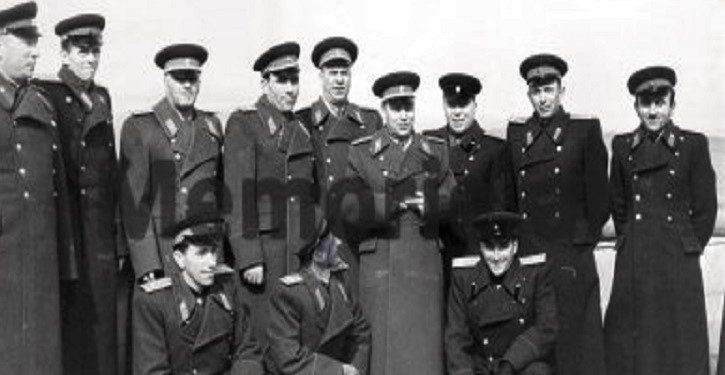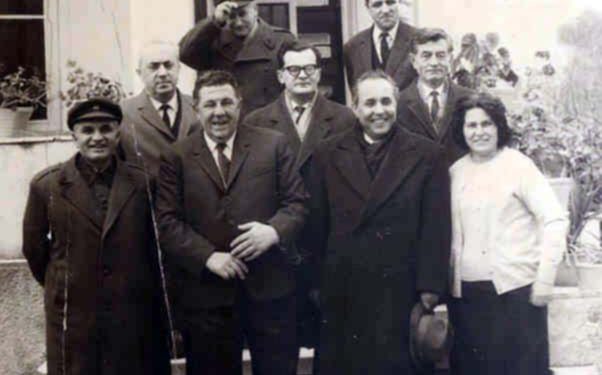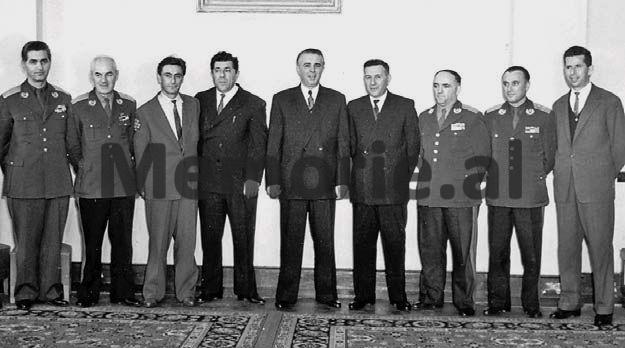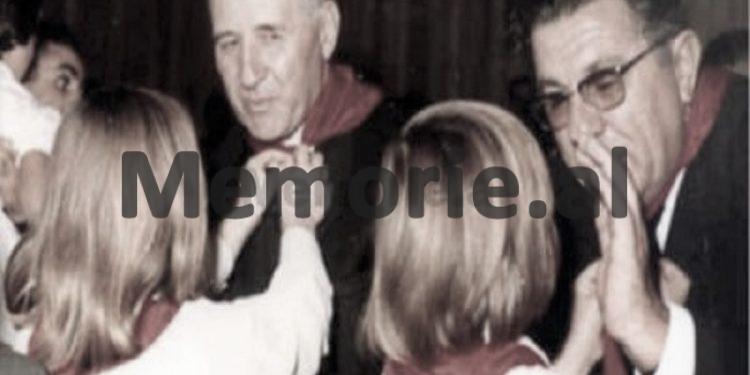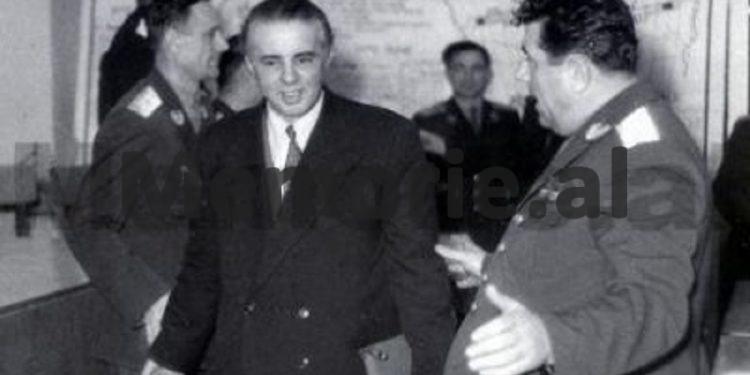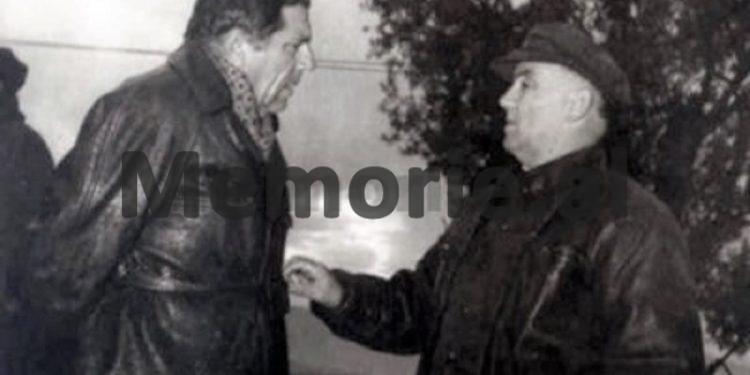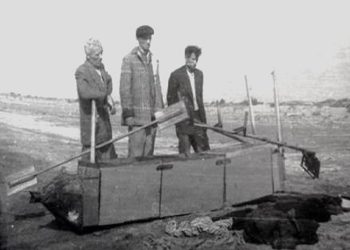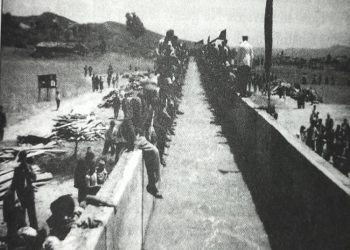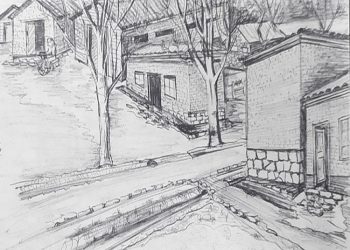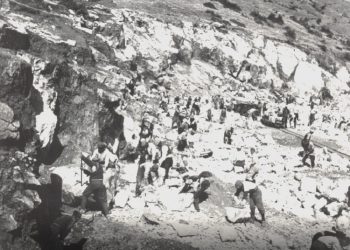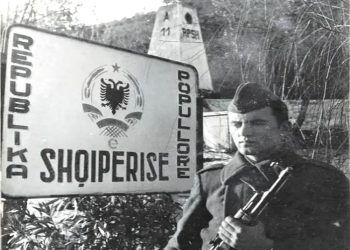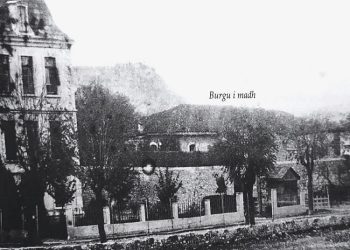Dashnor Kaloçi
Second part
Memorie.al publishes an archival document issued by the Central State Archive in Tirana (fund of the former Central Committee of the ALP), where is the minutes of the meeting of the Politburo held on December 8, 1970, where the secretary General of the Central Committee of the ALP and at the same time the Commander-in-Chief of the Armed Forces of the People’s Republic of Albania, Enver Hoxha, in his discussion, analyzed the work done so far in the Ministry of Defense and throughout the Army Albanian. Enver Hoxha’s full speech at that meeting of the Politburo, which as the main issue, had disputes, quarrels and conflicts that existed between the Minister of People’s Defense and at the same time the member of the Politburo, Beqir Balluku, with the Chief of Staff of the Albanian Army in The Ministry of Defense, Petrit Dume and the Director of the Political Directorate at the Ministry of Defense, Hito Çako. All the accusations that Enver Hoxha made in that meeting against the three highest leaders of the Ministry of Defense, regarding the deep contradictions that existed between them, where he, among other things, said: “If we take the issue from the position, whether in the Party, whether in command, it is clear to everyone that from this point of view in the ministry, Beqiri is the main responsibility. He must have had some kind of anti-social disposition towards the criticisms that were made to him from time to time for many problems. It may have seemed to Beqir that someone was trying to show that he was more specialized than him in military affairs, and, with his arrogance and all his actions, he must have wanted not only to lower his nose a little, for example, to Petrit “But if he had the opportunity, if I am not mistaken, to remove him or remove him from the General Staff at all, because the duty of the Chief of General Staff in the Army is a very important key function, he is the right hand of the Minister of Defense” .
Discussion of Enver Hoxha at the meeting of the Political Bureau of the Central Committee of the ALP
“THE LEADERS OF THE MINISTRY OF DEFENSE ARE RESPONSIBLY RESPONSIBLE FOR THE SITUATION IN THE ARMY AND SHOULD BE RESPONSIBLE BEFORE THE PARTY”
December 8, 1970
Continued from the previous issue
I think we need to reflect on another issue, about which I spoke a little while ago, the issue of arrogance, dressed in the clothes of simplicity, which also appears in the method and style of work of these comrades. Has this situation influenced the wards, headquarters and commands as well? As for the meetings of the Defense Council, these were done mainly at our urging, they were never done at the initiative of Beqiri or other comrades of the Ministry of Defense.
And it is understood: How is it possible that such problems are presented to the Defense Council by the Minister of Defense, when he himself, who is also a member of the Politburo, does not occasionally come to the First Secretary of the Central Committee of the Party and t ‘give him problems? I am talking here about solving the important problems of the Army and not about small and detached things, because these, of course, have been talked about. Key problems of the Army, therefore, have not been served to us and there are many such problems, you are constantly coming forward there.
If issues of this nature were to be raised to us for discussion, either face to face, or by two or three people, we would necessarily raise issues to present to the Defense Council. But such do not come to us. Who is to blame for this? We can also take some blame, in the sense that we put both feet on Beqiri in one shoe, despite the fact that sometimes we are not left without saying to do this or that.
But, Beqiri, who is in charge of the apostasy for the affairs of the Army, who should know where he hurts and where he slaughters them, what should be done and what should not be done, should have posed problems for us, and he did not come to us either even for what he has been told. I had once written a small paper on some issues of the army and gave it to Beqir to read and see with our own eyes what we could do with them. I did not do this writing in vain and comrade Beqir took it at once, sang it, “studied it” and told me that in August or September, he would come to report to me, because, according to him, until that time something would have realized.
I have been waiting for him to come, according to the word given, but I have not yet come to this problem, which I think is being worked on, because in that material we talk about the issues of the Army and the people-soldier. When in the reports that are given to us, despite the great successes we have in the Army, we see flaws, such as, for example, that the tactical, technical and physical preparation in the units, which should be considered the main indicator of our Army, is not done at the right level, then we have the right to think, why do we have the army, what is its purpose?
If in reports like this that Rrahmani tells us that the Army is lame in these directions, then it immediately occurs to us that it is lame in basic matters. The whole purpose of our work in the Army is to prepare the troops as close as possible to the conditions of combat. You raise this issue and work is being done in this direction. For this purpose, the draft theses of the Defense Council have been published. However, soldiers are not sufficiently taught the principles, norms, basic rules of combat, etc.
In the Army we do not see strictly enforcing regulations, orders and duties; in many cadres there are still misconceptions, such as, for example, the misconception that “only the army gathered in the barracks has discipline”, or the other sick idea, liberal and liquidators, according to which the army can do without regulations ”. I have already reflected on the problem I will talk about, but now I am concretizing it and I think we need to look at it even better and find out why we have these weaknesses.
Have you left the base? Or with the current organization, creating all these large military units has you not left the troops? Of course, these are needed, because the Army is built in such a way that it opens in time of war, that the soldiers must be well prepared, etc., but if we are to leave all these cadres, which we have gathered in them, t ‘take the breath away from the comrades down, passing through the wards like the wind or coming around the staffs boasting, instead of coming and sticking to learn concretely the staffs of the wards and sub-wards, to work and live with them , so we make a mistake.
While we find that the headquarters of some departments are not in order, that they have many weaknesses, not to mention the commands of the subdivisions, we must find the reasons why these commands are not in order. Have you not thought about this, which is a very important problem? These people we put there are not so young, they have graduated from the United School of Officers, they have been serving in the Army for years, then how can they not be able to properly lead a subdivision, when we, during the partisan war, without knowing the art of war at all, we led battalions, brigades, etc.?
I will talk a little about the reservists, but I have the issue here that, how is it possible for us to consider all these cadres as completely worthless people and, because some of them have reached the age of about 40, t ‘do we delete them from the subdivision command? I think that even in case of war, these people can do the duty of commander. We have established the existing organization with full conviction, but we must respond to this organization with a new working method and not continue with the old barracks method.
In addition, we also removed the ranks for known reasons. However, there are those who say “Since we have now become unit commanders or work near the unit headquarters, we no longer make it a cable to see how the troops down work.” And if we see, comrades, what we have gathered in the large units, it turns out that there are a lot of experienced staff, who, in case they do not change the method and style of work, in case they do not properly understand the removal of ranks, the simplicity of the cadres and the democratization of the army, while preserving the organizational forms we have, they will be sewn more to the headquarters offices and will deal with paperwork, rather than putting on troops. I cannot say exactly how much the comrades of the higher units put in and how they put in the troops, but if they put in and work well, then there is no reason for many of the ward or sub-ward staffs to be weak.
It is clear, then, that in this regard work is not being done properly. Maintaining in the army the current organization, which responds to the needs and conditions of a people’s army, such as ours, and, taking into account the weaknesses which were found especially in combat training, in the training of troops, I think we should reconsider the issue of commands and the headquarters of the higher units, as well as the existing staff of the Ministry of National Defense itself. I intend to make this review with the aim of placing the cadres in such a way as to be totally mobilized in the performance of certain tasks and, as far as possible, in no case to leave a path without reason for an unnecessary distribution. The purpose of this work should be, therefore, to make the cadres we have much more profitable, because not everyone is like that today, when the task is set to prepare all this large mass of people-soldiers.
Along with this fairer organization of the Army, of course, the method and style of work had to be changed by the Army cadres, since its education is not and can no longer be done in the forms and conditions that were before the organization. It was necessary to establish a method and work style quite different from the first to respond to the current opening of the Army. Of course, efforts have been made in this direction and we can say that there are successes, but I think that the commands of the high military units we have created have absorbed many of us and from the best cadres of the Army. It is also possible that we were a bit lazy in the staff of the commands and staffs and did not take into account the great needs that came our way. In these matters, of course, we have always been guided by the good intention of establishing commands with trained, experienced, skilled and more or less complete cadres.
We may have done so, to some extent, even in the commands and staffs of the lower units. In the analysis that was done, it has become clear that there are wards headquarters, subdivision commands, as I said before, that are very weak, so we are given a great task to raise all these now. Of course, educating and supplementing them must be done in a revolutionary way, trying to find many forms, some of which we have found, discussed and are discussing, but this requires, I think, that on the part of The Ministry of National Defense should, first of all, simplify its own apparatus, as is being done in other departments, in order to leave in the ministry the necessary number, capable staff for management, study and operation and remove from there all those who have occupied unnecessary and parallel posts and bring them to the base. But where to take them? The mentality has been created over time that the cadres who have worked in the Ministry of Defense and in the General Staff, who are too old, are not young, “they are of high caliber”.
So, if it comes to taking this measure, it immediately occurs to us that these should be introduced into the headquarters of senior army units. But such a thing would bring the swelling of their organics even more than they have today. Therefore, even for the commands and staffs of these units, the Ministry of National Defense I think to make a study to see if they should continue to really exist in this period, or to preserve them as the most appropriate forms, which have given proof of direction necessary and indispensable for the time of emergency. The question should be posed like this: Are these headquarters commands and all these qualified cadres we have above, profitable to stay there in these situations, when we have great needs to set up and strengthen the base? Do these cadres, working in these functions, really give the real help they could give, if they went to work in the base, in the commands or in the headquarters of the units?
So we can say in turn about the commanders and the members of the staffs of the units and about the excess staff that we can have in these units, seeing also from their age, who could go down to the commands and the staffs of the units, and the cadres of the latter in the commands and headquarters of the subdivisions. With such a push, of course not automatic, but carefully studied, we would strengthen even more than we have today the commands and staffs of the units, but at the same time we would strengthen especially the commands of the wards where we are weaker. With this we will have done one more thing, to bring the cadres, in fact, closer to the base, to the soldiers, to the concrete training, to the concrete implementation of the tasks. In this way we will help and better train the new staff and, within a short period of service, raise their level and skills.
Basically, we now lack cadres, that many of them have gone up to the top of the «pyramid-, because it is not thought so deeply about the wards and subdivisions, where the cadres have a heavy burden, because they train not only the active army, but also the reservists, and the rest of the people-soldier. In these conditions, are we allowed such a luxury? Are we allowed valuable cadres to continue to stand at the top of the “pyramid”? I say this not because they do not perform the task and competencies that have been given to them, but they are still far from the base, so I think that their profitability is not what it would be if they were more concretely connected with the body, going down to the base of the “pyramid”. Hence the question of the development of games with large participation, which are necessary, because they are an integral part of the entire activity of the Army.
It is true that these cadres and staffs, which have been created to lead high units of our army, in their work plans should also provide for such exercises, but we are tasked with tactical exercises, fire drills, etc., with a words, all the education of the Army, to be perfected at the base, in subdivisions and wards, so that we can then go out in large maneuvers. But, as we are being told, the staff and staffs at the base are in some cases weak. It is also noted that in the training of the corps, the leading cadres of the higher units are often missing, often even of the lower units, let alone the ministry. Such an issue deserves to be studied, why it can be a plus and more concrete measure that is added and strengthens the other concrete measures that we must take for the education of the leading cadres of military units, both for the active army and for the reserve. If we maintain the commands of higher units as we have them, simplify them, if not, we should think about creating other units more efficiently.
The current active army, for the reasons I said, we should consider not a barracks Army, but a school, from which the ordinary soldier, after performing military service, emerges a trained cadre, at least a squad or platoon commander. Of course, during the time in reserve, he will continue to train and further improve, but the soldier, once he has finished the army, must come out prepared for the purpose I said. In order to achieve this goal, it is necessary for the productivity of the cadres that we currently have in the army to increase and at the same time to think about making a more equitable redistribution of them. This issue, I think, should not be done by creating organizational perturbations, as has become the custom in the military. Once this study is done first by only three or four cadres of the Ministry of Defense, who will present it to us, showing us what comes out of it, is it right or not, will we have benefits from it or will not to have, we must maintain these existing commands and headquarters of higher units or we must not maintain them.
If it is necessary to keep them, to tell us how we should keep them, in case we break them and keep them in reserve organics, to give opinions on how to revive them, in order that all this great experience of gained not only to keep it at the level that has been achieved, but to further improve it with courses, with command-staff training so that the cadres, who, at certain times, will take command of the unit, do not detach themselves from practice and theory of the direction of these high units. I express this opinion not only from what I said above, but, as I pointed out, it also comes from the inappropriate method of work that the Ministry of Defense has, a method that is also reflected in the cadres of military units and so on down. Memorie.al
The next issue follows




